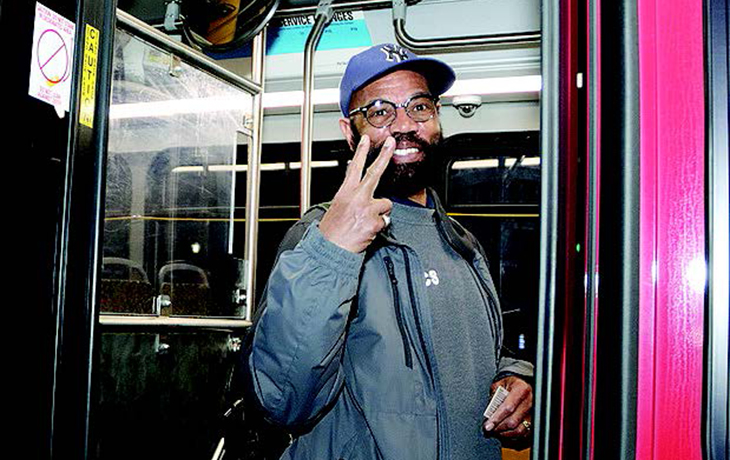Agency says new position crucial to improving its overall DEI strategy
by Rob Taylor Jr.
Courier Staff Writer
While it isn’t directly because of the heightened awareness of racial injustice following the death of George Floyd, caused by a White Minneapolis police officer in May, the Port Authority told the New Pittsburgh Courier that they’re focused on improving their Diversity, Equity and Inclusion efforts internally and externally now, more than ever before.
Port Authority, the mass transit agency for the 1.2 million residents of Allegheny County, is hiring for a newly created position, Director of Equity and Inclusion. In an exclusive interview, Katharine Kelleman, the agency’s CEO, told the Courier that it’s about time the Port Authority increased its Diversity, Equity and Inclusion efforts.
“Not having been there before, we have to start somewhere,” Kelleman said during the Oct. 16 interview. “This is one position, and this position will grow an entire department that helps us internally and externally.”
Typically, the percentage of African Americans using public transit in a certain city or county is higher than the percentage of African Americans in that city or county. That holds true in Allegheny County, where Blacks account for 14 percent of the population, but use buses and subways at a higher rate.
And since the coronavirus pandemic began, there’s been virtually no rush-hour working population on the subways, better known as the “T.” Much of the population who uses the “T” during the weekday rush are Caucasians living in the South Hills. As ridership drastically dipped throughout the “T” and most buses in March, April and May, the “front line” workers were the primary workers using public transit. A sizable number of “front line” workers who rode the buses were African Americans, according to a New Pittsburgh Courier analysis of riders commuting to and from Downtown in the spring.

LENEY STEVENSON II, boarding a Port Authority bus. (Photo by Courier photographer J.L. Martello)
What would the Port Authority look like without its Black ridership, who, pre-pandemic, are the primary reason the P1 East Busway/All Stops route is the agency’s most popular route? What would the Port Authority look like without its sizable number of Black employees, many of whom are bus operators, maintenance specialists and central office administrators?
Adam Brandolph, spokesman for the Port Authority, said 829 of the 2,747 employees (30 percent) are Black.
“We count who is applying, who we’re able to recruit, how we promote,” Kelleman told the Courier, “but we have to be beyond just the diversity of the folks walking in the door.” She said that proudly stating the company is about “equity and inclusion” means that “anybody feels that they are able to excel and that the structures are there to help them (the employees) and make sure they feel comfortable walking in.”
Kelleman added: “If diversity is making sure that we are getting to a really broad group of people, inclusion for me would be that once we get to this broad group, their voices are heard and are included; and equity is, we’re giving them the same weight and the same opportunity to participate.”
The Port Authority plays a huge role in Allegheny County’s ecosystem, particularly for African Americans. It’s pubic transit that sizable numbers of Blacks use to get to and from work. It’s public transit that gets formidable numbers of Black students to and from school. It’s public transit that saves the day when your car breaks down, if you’re going to the Steelers game or heading Downtown for a journey to Point State Park.
Kelleman said there’s so many ways the Port Authority can benefit the local Black community from a strategic, financial level, including spending more with local Black businesses on system plan contracts, or even “who we’re calling to cater lunches when we do those things,” she said. “We generate a lot of money for the local community, and are we using our equity principles? What are they? Are we using them to make sure that we’re building our community? Are we doing that as we employ people?”
Kelleman wants the Port Authority to be an “equity partner” in the Pittsburgh region, such as helping to support more affordable housing, and addressing any “side effects of redlining that might be still in our routes” from decades past. “Just diversity is not going to cut it; we really need to be thinking equity,” she said.
When some African American employees started wearing “Black Lives Matter” themed face masks on the job, the Port Authority told the employees those particular masks were not permitted. It caused a flurry of blowback within Pittsburgh’s Black community, but the Port Authority said if they allowed certain employees to wear “Black Lives Matter” masks, then they’d have to allow other workers to wear the masks of their choice, too.
The agency has since announced that it’s updating its uniform policy to include employees wearing only agency-approved masks. The Port Authority is responsible for supplying the masks, which will be plain black, plain navy, black with “Port Authority” printed on them or black with “ATU” printed on them. “ATU” stands for the Amalgamated Transit Union.
“For people who work at Port Authority who are African American, in addition to dealing with COVID, they’ve had so much on them in many cases this year…they might be working right next to a White employee who hasn’t felt the same stress and isn’t feeling the same level of wear and tear on themselves,” Kelleman told the Courier. “Are we appreciating that? Are we giving everybody the opportunity to speak about what they’re experiencing?”
Diversity, Equity and Inclusion departments at transit agencies are not new. In Dallas, Tex., the Dallas Area Rapid Transit (DART) has what it calls a “Diversity Department,” which strives to increase minority contracts with the transit agency and help facilitate a diverse, inclusive internal culture. In 2000, DART signed a Memorandum of Understanding with the Dallas Black Chamber of Commerce, “to increase participation of African American-owned businesses in DART’s employment, procurement, outreach, subcontracting opportunities and business development programs.”
The Metro Atlanta Rapid Transit Authority (MARTA) has an Office of Diversity and Inclusion in place, which, according to the agency’s website, “serves as an advocate of the agency’s commitment to the promotion of a work environment that recognizes and values the diverse social profile of the MARTA service area. As such, the office ensures the equitable representation and advancement of protected group members at all levels of employment, the utilization of small, socially and economically disadvantaged businesses in contracts and procurement, the equitable distribution of transit service and benefits, as well as the non-discriminatory impact of agency decisions and activities.”

INEZ COLON is the Port Authority’s Chief Human Resources Officer. The person hired as the Port Authority’s Director of Equity and Inclusion will report directly to Colon.
The Courier has learned that the job requirements for the Director of Equity and Inclusion position at the Port Authority include: Bachelor’s degree from an accredited institution in Human Resources, Business or a related discipline; minimum of eight years of experience leading diversity programs; minimum of two years of experience developing and conducting diversity and inclusion training; demonstrated ability to work effectively with a culturally diverse workforce and provide leadership in organization change; and knowledge and proven expertise on “leading practice” diversity initiatives. The Director of Equity and Inclusion will report to the Chief Human Resources Officer, who is Inez Colon. Colon is an African American woman.
Kelleman told the Courier the agency is courting local and national candidates, and is searching for the right candidate to fill the position. There’s no exact timetable as to when a person will be hired, but Kelleman stressed that the Port Authority has begun pushing their Diversity, Equity and Inclusion efforts. Thus, when a person for the position is hired, they won’t be starting from scratch. The agency’s strategic plan, Kelleman said, has been put on pause, “so we can make equity a core value going forward.”
(Those interested in the position should forward a cover letter and resume to Robyn Taylor, in the Port Authority Employment Department, at rtaylor@portauthority.org)
 KATHARINE KELLEMAN, right, the Port Authority of Allegheny County’s CEO, with Doris Carson Williams, president of the African American Chamber of Commerce of Western Pennsylvania. Kelleman is leading the charge for the Port Authority to improve its Diversity, Equity and Inclusion efforts.
KATHARINE KELLEMAN, right, the Port Authority of Allegheny County’s CEO, with Doris Carson Williams, president of the African American Chamber of Commerce of Western Pennsylvania. Kelleman is leading the charge for the Port Authority to improve its Diversity, Equity and Inclusion efforts.